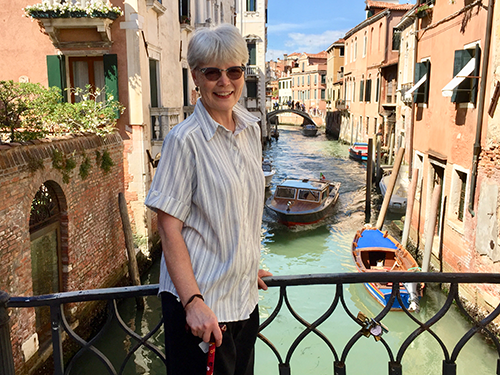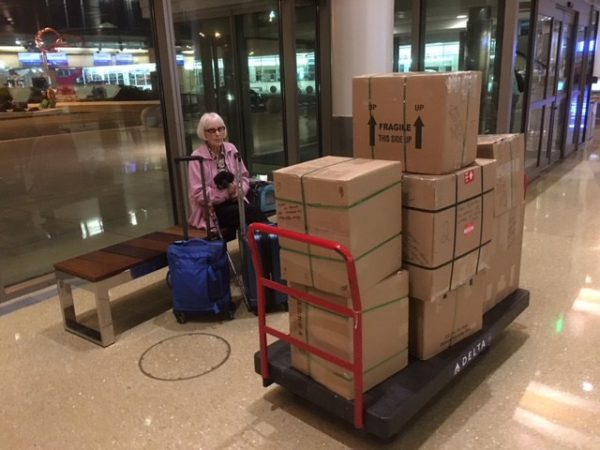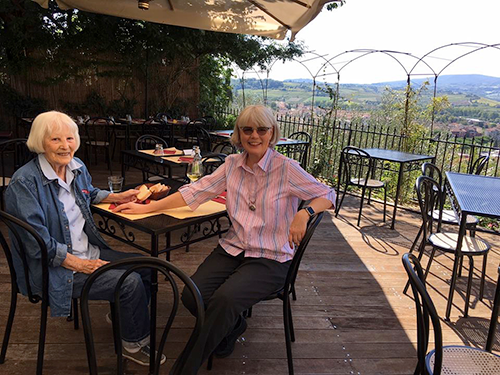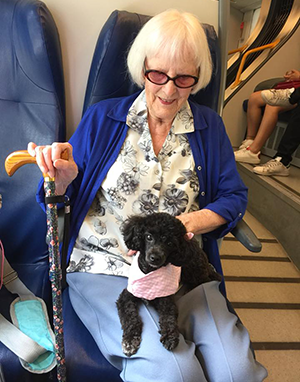Today I want to celebrate someone who has been a source of inspiration for me in the past year or so.
She’s a novelist who writes historical fiction, and is currently finishing up a manuscript that she will pitch to agents. She’s actually a client of mine too, I’ve been helping her get creative clarity in her work, develop her platform, and turn her writing hobby into a writing career.
So, this is her, Alison Taylor-Brown:

A year ago she did something astounding. After living in Arkansas pretty much her entire life, she picked up and moved to Italy. But she didn’t do it alone. She brought along her 90 year old mother who is legally blind and has severe hearing loss, as well as her 2 year old dog Prose.
Can you just imagine making such a big transition, and doing so with these two characters? Here they are at the airport:

And in case you are wondering, no, Alison does not speak Italian fluently (although she is learning). So why did she make this transition? For the reasons that any writer would love:
- To conduct primary research on her historical novel.
- To be surrounded by the history she loves.
- To experience and become a part of a different culture.
How did all of this happen? Amidst some big life changes and deep reasons. This is how Alison has characterized the last year of her life:
I really didn’t know if it would be a new life, a great adventure, or a total fiasco. In many ways, I still don’t.
Symbolically, we left Arkansas on September 19, 2018, my grandmother’s birthday. On the surface, my grandmother was a homebody whose greatest pleasure was going for walks in her beloved Ozarks, strolling around her yard and garden, or reading any book within reach. But she also loved to travel, and I am so happy that I was able to take her all over New England, a little of Canada, and even New York City. And it was there in 1984 that she made a statement that defines my desire to live in Italy.
As we were driving in NYC, the apartments looked pretty old and there was laundry hanging outside the windows (so Italian). Suddenly my grandmother said, “I’d like to move here and live like these people.”
My ever-so-literal mother was also in the car, and she said, “Surely not. Why on earth would you say that? Look how dirty it is and crowded and unsafe.”
Now we all knew that my grandmother wouldn’t leave her beloved home in the mountains and her daughters who lived nearby. But she said, “Because I’d like to live a totally different life just to see what it’s like. To figure out how to get by in a whole other world.”
I have thought of that so much because that is exactly what brought me—and keeps me—in Italy. The moments when I feel the cultural difference most acutely is when I am most enchanted. I’ve always loved jigsaw puzzles, and now I am the odd piece, constantly trying to figure out how to fit myself into the bigger picture of my Tuscan village.
People who make a big move are running away or seeking something or probably both. I left the U.S. months after my father’s supposed suicide and my husband’s revelation, after thirty-three years together, that he wanted a divorce. Not to mention the death of my very good dog Traveler.
Certainly my feelings have evolved in the last year. When we came, I brought four suitcases in total for myself, my mom, and Prose (who is a very material girl). One of those suitcases was full of research for the novel I’m writing.
I brought nothing sentimental except Traveler’s ashes. I wanted no reminders of the past, no loose ends of pain. I wanted a clean page for my new chapter, my new life, the new me.
When I returned to Arkansas six months later for a whirlwind ten days of appointments and tasks, I had a half year under my belt of learning new ways to do things, of figuring out challenges, of thinking about more than how the men I loved betrayed me. Now, coming back to Arkansas was almost like lifting up the bandage very carefully to see how the healing was progressing.
I discovered that I was ready to begin to join the fragmented pieces of myself back together. This time, when I boxed up my complete historical research library to bring to Italy, I allowed myself one box, maximum 70 pounds, for anything I wanted. I put in all Traveler’s little sweaters, hoping Prose could wear them. I put in some mementos of good moments with old friends. I put in pictures of my grandparents and dad. I tore all the written pages out of a lifetime of unfinished journals and brought the pages.
I felt as if I were gluing myself back together, forging the new me and the old me into one stronger person.
Sometimes, I am filled with wonder. Who is this woman who can find her way around foreign cities with no help, who can usually make herself understood in pidgin Italian, who has lost 30 pounds? I don’t know her. Other times, I find I’m still the same insecure, easily embarrassed nerd I always was. The truth is, of course, I am all those things. It just depends on which side of myself I want to turn toward the light.
For years, I abdicated as much responsibility as I could because it was easier. It was easier to let my husband manage the finances or figure out the TV remote. When we traveled, it was easier to let him drive the rental car, read the walking map, convert kilometers to miles. I chose helplessness because it was so easy.
Now, I choose strength. I choose to turn that side of myself to the light. I can convert gallons to liters, euros to dollars, miles to kilometers and know how much it costs to drive a hundred miles. And then, I can drive it. I choose to be the person who can do the thing—whatever it might be—that needs to be done.
What is true for me is, of course, true for us all. If I know anything, I know that I am not special. “You’re so brave,” people say. “You’re so strong.” That is simply not true. I just try not to talk myself out of things because I know that any situation can be faced with this simple procedure: Show up. Take the next step. Solve today’s problem.
You really don’t have to have it all figured out ahead of time. You can’t anyway. I had no idea how I would feel living in Italy. Maybe I would hate it. How could I know? But I did know this: nothing has to be permanent.
So, here I am, a year in. Who knows where we’ll be in another year. Maybe right here. Maybe not. I’m figuring it out as I go. Aren’t we all? But one thing I know. We all have a strong side. And that should be the one that we turn toward the light.
This is Alison and her mom — two women who spent a lifetime in Arkansas — enjoying the daily life of living in Italy:

I want to thank Alison for inspiring me so much in this past year, and for allowing me to share her writing in this post.
So many of the writers I work with each day in my Creative Shift Mastermind and outside of it are focused on making their creative work more central to their daily life. When I consider all that Alison has done, it seems symbolic of the many little things that each of us can do each day to immerse ourselves in our creative work. To choose to live the life of a writer.
Could Alison have rejected the idea of moving to Italy because she owned a house and a lifetime of possessions? Sure. Or because she couldn’t possibly bring her mother? Sure. Or her dog? Sure. Or because she didn’t speak the language? Sure. Because of the mountains of paperwork that would no doubt be a part of it all? Sure.
But none of that stopped Alison. Instead, she has taken a journey filled with new experiences, friendships, and creativity.
You don’t need to move to Italy to live your own version of a writer’s life. But is there one action you can take that would nourish your writing?
I also want to encourage you to follow her journey:
Her newsletter
Facebook
Twitter
Wait, what? You want a picture of Prose too? Okay, here she is with Alison’s mom on the train to Pisa:

I’m almost certain that even though Prose lives a cosmopolitan life in Italy, she barks with a thick Arkansas accent.
-Dan
